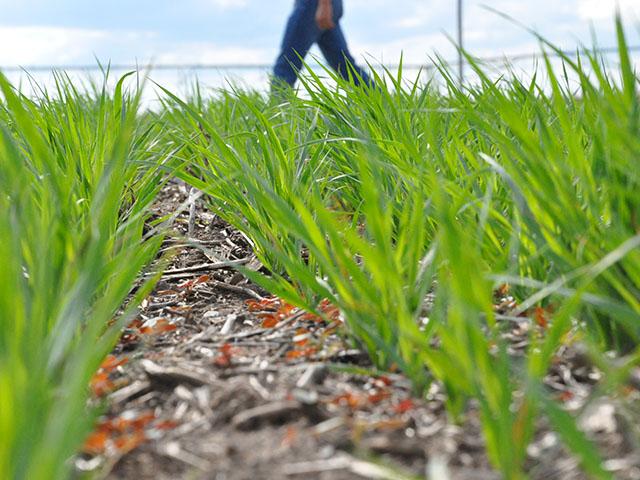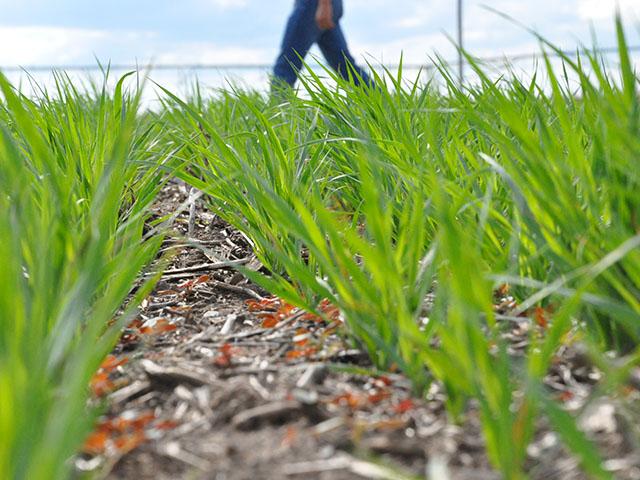Ag Policy Blog
Details for SAF Tax Credits Delayed, But Will 'Send Right Signal,' Ag Secretary Says
WASHINGTON (DTN) -- While groups are clamoring for certainty on how the Department of Treasury calculates tax credits for sustainable aviation fuel, Agriculture Secretary Tom Vilsack said the adjustments to the greenhouse gas model, or "GREET" model, won't be completed until next month but will "send the right signal" to both farmers and biofuel producers.
Yet, the farm practices eventually recognized by the Treasury Department for the Sustainable Aviation Fuel "40B" tax credit may need to be broadened to help provide more benefits to biofuel producers and farmers under the Clean Fuel Production "45Z" tax credits, Vilsack said.
The administration has been retooling the Greenhouse Gases, Regulated Emissions, and Energy use in Technologies (GREET) life cycle analysis to be used by the Treasury Department to detail how sustainable aviation fuels (SAF) will qualify for the 40B tax credit and more long-term, the 45Z tax credits.
A group of 26 farm and biofuel organizations from 13 states on Thursday wrote Biden administration officials, expressing disappointment that federal agencies missed their own self-imposed deadline to update the GREET model, "but we appreciate the importance of getting the modeling right." Cosigners of the statement included Growth Energy, Clean Fuels Alliance America, National Corn Growers Association, National Farmers Union, National Oilseed Processors Association, and the Renewable Fuels Association.
The various groups warned officials against changing the GREET model "that would stack unwarranted penalties on agricultural feedstocks, cut rural America out of a promising green energy market and undermine any realistic path to achieving U.S. SAF goals."
At a House agricultural appropriations hearing, Rep. Ashley Hinson, R-Iowa, asked Vilsack about the status of GREET model changes. Talking about biofuel production in Iowa, Hinson noted the tax credits will be "absolutely critical for our industry" and it is important that the GREET model recognizes farmers' conservation practices. Hinson asked Vilsack for an update on the status of the GREET and to "ensure that the scientists are driving that review."
To garner the 40B and 45Z tax credits, an aviation fuel must show at least a 50% reduction in greenhouse gas emissions compared to traditional aviation fuels. A key for biofuels such as ethanol will be to consider farm practices and get credit for practices that lower greenhouse emissions of the feedstocks going into biofuel plants as part of that lifecycle modeling.
Along with using the GREET model, Vilsack said right now it's important to make sure the Treasury Department and others "are fully aware of what steps farmers do, in fact, take to be more sustainable in the production of corn and soybeans as a feedstock for sustainability."
P[L1] D[0x0] M[300x250] OOP[F] ADUNIT[] T[]
Vilsack added, "I'm confident there's a recognition that no-till, cover crops and energy-efficient fertilizer are the kinds of things that ought to be included as factors to calculate whether a particular sustainable aviation fuel meets a threshold of ... 50% improvement. So, I think I'm confident we're going to send the right signal."
There will need to be a broader conversation on the 45Z tax credit to see whether "other aspects of climate-smart agriculture -- sustainable agriculture -- ought to be considered" in the GREET calculations. "I think there's a recognition that farmers are going to play an integral role in the development of SAF here," Vilsack said.
Lanza Jet, which built a 10-million-gallon SAF plant in Georgia, is importing ethanol made from Brazilian sugar cane so the aviation fuel can qualify for an EPA renewable identification number (RINs) credit.
HINSON: FARMERS NEED TO BE RECOGNIZED
DTN asked Hinson about whether groups are raking issues over ensuring domestic SAF also qualifies for an EPA biofuel credit under the Renewable Fuels Standard. Hinson said she had just met Thursday morning with corn farmers on that issue.
"Certainly, it's about being able to be competitive with Brazil," Hinson said. "And the last thing I want to see us do no matter what model we're using or the tax credit specifically, is ceding any ground to allow for the importation of ethanol from or those products from Brazil is cutting into our markets."
Hinson added it also is important that farmers are recognized for their conservation practices.
The 40B tax credit sunsets at the end of 2024 and the 45Z tax credit sunsets at the end of 2027. Hinson also was asked about extending those tax credits. She said she is putting together a coalition specifically to look at extending those SAF tax credits and others.
Vilsack, acknowledging the 40B tax credit won't provide as much benefit long-term, said recognizing climate practices provides the right "messaging" for the 45Z tax credits down the line. Vilsack told reporters it's important that the GREET outcome provides incentives for biofuel producers and farmers when it comes to conservation practices.
"So, you want to send the right message that climate-smart, sustainable agriculture, that folks understand it is a significant factor in producing the feedstocks necessary to produce this sustainable aviation fuel."
EDUCATION PROCESS RECOMMENDED
While some practices are well-known, other farm practices that reduce emissions or sequester carbon on the farm may not be as understood, so there will need to be an education process, as well as some verification to prove those emission benefits are there to get below that 50% emission reduction for the fuel.
"So, whatever comes out on 40B, I don't think you want to say, 'Well, that's the universe.' It's not. It's a signal that climate-smart sustainability is in," Vilsack added. "There is more work to see how expansive the 45Z, -- which is the real, that's the real deal -- how expensive that can be, and that may take a little more work."
Asked if the changes made to GREET for the tax credits will apply to the Renewable Fuels Standard overseen by EPA, Vilsack said, "I don't know if I can answer that question today. I'm just trying to make sure we get the messaging right."
Biofuel groups and others are already developing different partnerships to help calculate farm practices. On Thursday, Siouxland Energy Cooperative of Sioux Center, Iowa, and Continuum Ag of Washington, Iowa, announced an agreement to "provide farmers a path to receive potential premiums associated with Carbon Intensity (CI) Certified Grain. Continuum Ag will provide farmers with the certification to participate while Siouxland intends to be a buyer for the certified bushels. The goal is to offer premiums for certified grain and capitalize on the pending 45Z Clean Fuel Production tax credits," the companies stated.
Chris Clayton can be reached at Chris.Clayton@dtn.com
Follow him on X, formerly known as Twitter, @ChrisClaytonDTN
(c) Copyright 2024 DTN, LLC. All rights reserved.






Comments
To comment, please Log In or Join our Community .